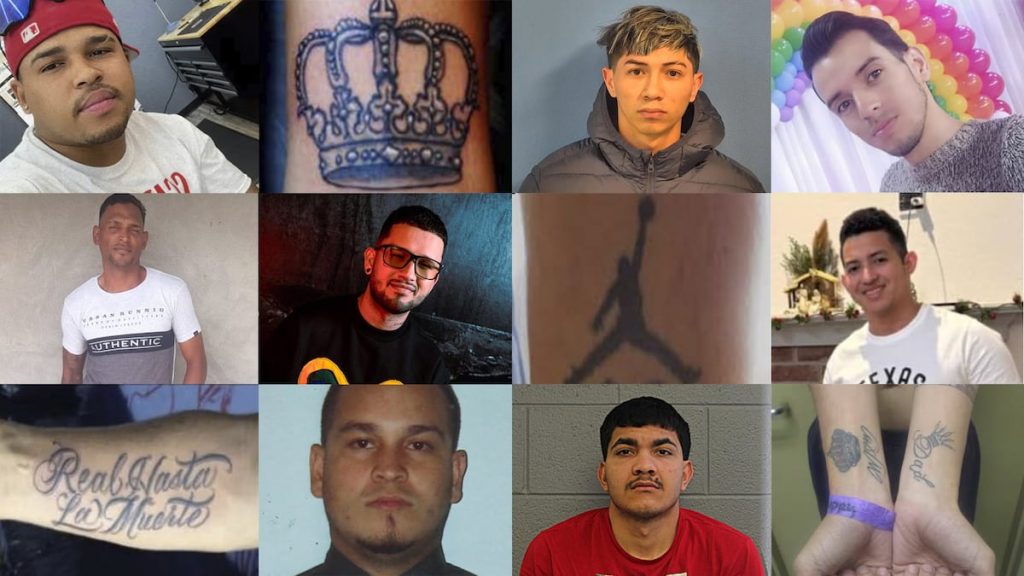On March 15, Donald Trump and Nayib Bukele turned 238 different stories into one. A day earlier, 26-year-old Luis Carlos José Marcano Silva called his mother from a migrant detention center in Texas. Adelys Del Valle Silva was celebrating her birthday in Margarita Island, Venezuela; she was happy to hear her son’s voice, but noticed something strange. A few hours later, another call came in. Her son was crying. He didn’t want to ruin his mother’s day, but he had to tell her that he was going to be deported to Venezuela the next day. He couldn’t understand, if he had done nothing wrong in the almost year and a half he had been living with a temporary permit in the U.S. after crossing the border and applying for asylum, he told his mother weeping. If he was removed from the country, he thought, his wife and two daughters, aged eight and three, who had arrived with him, would be left behind alone. Adelys tried to comfort her son. They would find a way to be together once he was back home. But Luis Carlos never returned. He was deported from the United States to El Salvador and detained in an infamous maximum security prison. His mother and wife have not heard from him since.
Luis Carlos is at El Salvador’s Terrorism Confinement Center, known as CECOT, along with 237 other Venezuelans, after Donald Trump’s government deported them under the alleged claim that they are members of the Tren de Aragua gang, a group declared a terrorist organization on the first day of the Republican’s return to the White House. And he did it to the Central American country thanks to the complicity of one of his biggest allies in Latin America, the president of El Salvador, Nayib Bukele, who has boasted of the agreement to receive alleged criminals from the United States. The practice of sending people to a third country is increasingly used and is not illegal in principle, but none of the deportees were brought before a judge and, since they have been in the Central American jail, none of their relatives have received any proof of their condition.
In the case of at least 137 of the 238 deported Venezuelans, Trump invoked the Alien Enemies Act, enacted in 1798 and only previously activated in the War of 1812 and the two world wars. This law allows for the expulsion of foreign nationals if they can be proven to be part of an invading force. The U.S. administration’s argument, in line with its anti-immigrant discourse, is that these men, whom it labels as gang members mostly without proof, amount to a conquering army.

Family members of the deportees argue that this is not the case. Many recognized their sons, brothers, nephews, or husbands in the images that Bukele published when they arrived in El Salvador. In them, Bukele, who is set to receive $20,000 a year from the U.S. government for each prisoner, boasts of how these men were greeted with their wrists, hips and ankles shackled, along with 23 Salvadorans accused, for their part, of being members of the MS-13 gang.
As do hundreds like him, Noel Guape, uncle of deportee Roger Eduardo Molina, suspects that his nephew’s fate was sealed the moment the government saw the tattoo of a crown on his chest. He was being routinely interrogated by immigration agents at the Houston airport on January 8, where he had arrived from Bogota with his papers in order after following a UNHCR asylum program. “The officials told him that they had investigated and that they could see that he had no criminal record, and what kind of record would he have if it was his first time in the United States?”. Still, since that day Roger has only slept in detention centers or jails, and has not seen his girlfriend, who was traveling with him and was immediately returned to Colombia.
The fact that tattoos are for U.S. authorities one of the indicators for identifying suspected members of the Tren de Aragua was confirmed at the end of March, when the American Civil Liberties Union (ACLU) published as evidence in a lawsuit a Department of Homeland Security guide that establishes a point system for determining whether a suspect belongs to the gang. Reaching eight points is equated to being a gang member, a very easy sum to achieve under the criteria detailed in the document. For example, having tattoos such as a crown, a train, a watch, or the popular phrase “Real hasta la muerte,” by reggaeton musician Anuel AA, is worth four points. Wearing sportswear from U.S. teams such as the Chicago Bulls or the Jordan brand awards another four points.
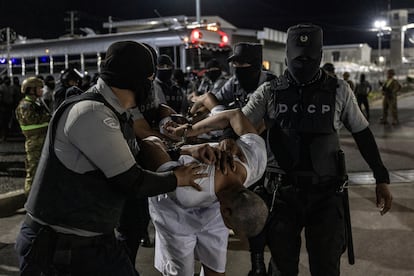
Such tattoos and clothing are very common among young Venezuelans. For Adelys del Valle the conclusion is simple: “Being Venezuelan is now a crime.”
Venezuelan journalist Ronna Rísquez, author of the book El Tren de Aragua: La banda que revolucionó el crimen organizado en América Latina (Tren de Aragua: The gang that revolutionized organized crime in Latin America, Editorial Dahbar), assures that according to her own research, tattoos or clothing are not indicative of gang members, and she also doubts that those deported are really members of the group. “It is likely that there are members of the Tren de Aragua in the United States, but there are no details or official evidence coming out of a police investigation. When you try to look into it, it’s like scraps that an official said at some point.”
Moreover, adds Rísquez, since an operation by Venezuelan authorities in 2023 in the Tocorón prison in Aragua state dismantled its center of operations, the group has been weakened and its activities and dynamics are unclear, while the whereabouts of its leaders are unknown. “To call it a terrorist organization is absolutely disproportionate. They don’t even come up to the soles of Al-Qaeda’s shoes and neither if we compare it even to the Mexican cartels [also declared a terrorist organization by the Trump administration], that are singled out for bringing in tons of drugs that have killed thousands of Americans. That doesn’t mean that the Tren de Aragua are saints, of course.”
Human Rights Watch (HRW), which is conducting its own investigation, has confirmed the absence of criminal records for most of the Venezuelan deportees to El Salvador. They have been exhaustive, and have searched for such records in Venezuela, in the United States, at the federal level and in each of the 50 states of the nation, as well as in other countries through which the deportees have passed at some point, such as Colombia, Peru or Chile. There are some who do have warrants for their arrest, and a few who have committed minor offenses. The conclusion of the organization, however, is that this is a case of a mass arbitrary detention and forced disappearance.
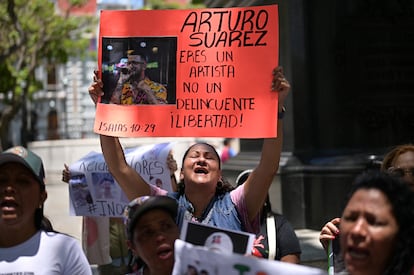
The deputy director of HRW’s Americas Division, Juan Pappier, justifies the application of these categories: “At no point were they notified that they were going to be deported to El Salvador. And they were sent there from one day to the next. The U.S. immigration authorities erased their cases from the database used by lawyers and families to locate people who have open cases or are detained. When they call ICE (Immigration and Customs Enforcement), at best they are told that their family members were deported, but nothing else. In other words, there is a constant refusal to confirm the whereabouts and fate of these people, which constitutes an enforced disappearance under international law.”
The government of Nicolás Maduro in Venezuela shares on this rare occasion the opinion of an organization that has repeatedly denounced him. On March 24, a Salvadoran law firm hired by the Venezuelan vice-presidency filed a habeas corpus before the Supreme Court of El Salvador to demand the immediate release of the Venezuelans imprisoned in Bukele’s mega-jail. Senior officials of the Venezuelan regime have been in contact with relatives of the detainees and have promised to do everything possible to secure their return to Venezuela. However, the country has no diplomatic relations with El Salvador, so there is much uncertainty about the success of the mission.
After a month without news, the anguish of family members is growing. They all know about the allegations of mistreatment and human rights violations at the CECOT, the prison where the deportees are being held. And these become all the more frightening when they have already heard them describe the terrible conditions in U.S. detention centers.
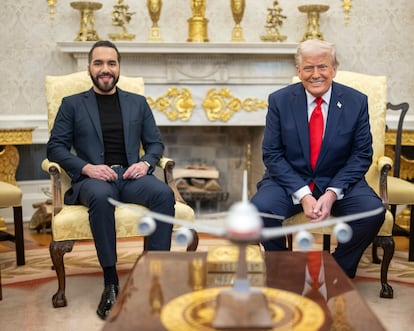
Julio Rafael Fernández Sánchez was held for eight months in one of these centers in the state of Arizona, after being detained in the border city of Nogales on July 18 last year along with his wife, Carolina, and their 17-year-old son. They entered the country with an appointment they got through the CBP One application, which the Biden administration launched to expedite entries and asylum requests, after six years living in Peru, where they set up a small motorcycle cab business, and several months working in a taqueria in Mexico City. The woman and the teenager were released, but Julio never left the center. The moment they saw the tattoo of a clock on his arm, an anniversary gift from Carolina, his luck turned.
Four days passed before Carolina was able to talk to him. “They said they were going to question him and everything went fine. But there he remained. I even got him his criminal record because he thought that’s why he wasn’t getting out. And months went by and nothing,” says the wife, who talked to Julio every day. “He said he couldn’t talk much because the calls are recorded. But at one point he said that it hurt a lot to raise his arm, that he had a tear. And I didn’t understand, if he said he slept well. But he pretended to be strong so as not to worry me. What did worry him was that he couldn’t go to the bathroom [due to stomach problems]. He would go 20 days without going, and he would ask for a pill or something and they wouldn’t give him anything,” she says, her voice breaking as she imagines her husband, who turned 35 years-old last Thursday in the black hole of the CECOT, suffering.
Several relatives have gone so far as to fear that their sons or husbands would commit suicide because of the terrible conditions. For this reason, at this moment, as if it were a kidnapping, the least they are asking for is proof of life of the detainees from the Salvadoran government.
The battle in the United States is now legal and revolves around the denial of due process. As the flights loaded with migrants accused of being invading gang members departed, a federal judge named James Boasberg ordered the suspension of the law justifying the deportation because the detainees had not been in court, as required by law. The government ignored that order —Bukele’s message mocking Boasberg, shared by several senior Trump administration officials, encapsulated that moment: “Oopsie… Too late,” he wrote on X— and that has precipitated a legal showdown that has quickly reached the Supreme Court.
The issue may yet escalate into a constitutional crisis over the limit of Trump’s executive power if he chooses to defy court orders. Currently the decision of a divided Supreme Court that allowed the use of the Alien Enemies Act, but which also determined that a deportation must be ordered by a judge, governs. Judge Boasberg said this week that there is a basis for holding the government in contempt, while the Supreme Court prohibited early Saturday morning the expulsion of a group of Venezuelans detained in Texas while their case is analyzed in court.
On the other hand, rights groups, led by the ACLU, have sued the government, arguing that the conditions for invoking the old law —a war or an actual invasion— are not met. Last month, Appeals Court Judge Patricia Millet was blunt: “The Nazis got better treatment under the Alien Enemies Act.”
Most significant events:
-
March 14
The government invokes the Alien Enemies Act by presidential order.
-
March 15
A lawsuit by civil rights groups seeks to prevent the use of the law. In the afternoon, the Trump administration announces it will enforce the law and three deportation flights depart with 238 Venezuelans and 23 Salvadorans aboard. As the planes depart, Federal Judge James Boasberg orders the suspension of deportations under the law.
-
March 16
In the early hours of the morning, flights arrive in El Salvador with deportees. President Nayib Bukele posts a video on social media showing their arrival and another mocking Judge Boasberg. Several Trump administration officials echo or share the posts and deny having disobeyed Boasberg’s court order.
-
March 17
The Department of Justice asks that Judge Boasberg be recused and government lawyers refuse to answer his questions.
-
March 18
Chief Justice John Roberts admonishes President Donald Trump for his attacks on Boasberg, whom he had called a «far-left lunatic,» and also for calling for him to be recused.
-
March 20
Judge Boasberg redoubles his pressure and points out that the government’s response is «woefully insufficient.»
-
March 24
Judge Boasberg rejects the government’s request to withdraw the two-week precautionary ban on deportations under the Alien Enemies Act. In El Salvador, a law firm hired by the government of Nicolás Maduro asks the Salvadoran Supreme Court to release the detained Venezuelans.
-
March 26
Trump’s Homeland Security Secretary Kristi Noem visits El Salvador, strolls through the CECOT and brags about the transfer of Venezuelans she calls dangerous gang members to the Salvadoran prison.
-
March 28
The government takes its case to the Supreme Court by demanding that Judge Boasberg’s ban be lifted.
-
March 31
Secretary of State Marco Rubio announces the resumption of removals under the law with the deportation of 17 more people to El Salvador.
-
April 7
A divided Supreme Court allows the government to continue using the Alien Enemy Alien Act for deportations, but notes that immigrants must have the opportunity to challenge their deportation before being removed from the country and that they must have a «reasonable time» to go to court.
-
April 9
Two judges, one in Texas and one in New York, block the use of the law in their districts.
-
April 14
Nayib Bukele visits the White House and assures that he does not have the power to get «terrorists» out of his mega-jail.
-
April 16
Judge Boasberg finds probable cause to hold the Trump government in contempt.
But while that battle is being fought in the highest courts of the country, the relatives of the detainees must live with the silence from the CECOT. In the last month, EL PAÍS has told the stories of several detainees, such as Arturo Suárez-Trejo, Frizgeralth Cornejo, Brayan Palencia Benavides, Alirio Belloso or Mervin Llamares. In all these cases, relatives in Venezuela, Colombia or the United States keep their voices raised to make their situations public and increase pressure on the authorities. In private, they endure the pain of uncertainty.
“Not knowing anything is the hardest thing,” says Nataly Villalobos, sister-in-law of deportee Alirio Belloso, 30, originally from the western Venezuelan city of Maracaibo, and who entered the United States through the southern border in November 2023. “The whole family is very sad and desperate.” They have had to split up. Alirio’s brother has stayed in Maracaibo, but his wife and mother have temporarily moved to Caracas in order to follow the steps the Venezuelan government is trying to take. Alirio was arrested in a police raid in Utah five days after Trump took office. He had been working as an Uber driver for a few months and had no police history, as evidenced in his immigration record.
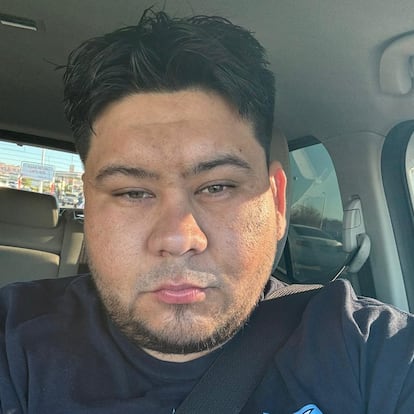
In Colombia, where 24-year-old Brayan Palencia Benavides’ entire family has lived for a decade, his mother, Amine Ester Benavides, has lost her appetite: she feels guilty if she eats three times a day when she doesn’t know if her son is being fed properly. Brayan was detained on January 30 in Los Angeles when he went to an immigration appointment to regularize his status after more than a year in the country, during which he worked in construction with an uncle in Miami. “I am very sad,” Amine says plainly. Her husband, Erly Palencia, uses another adjective: “She is stunned”. The consulates have not responded for Brayan. Nor have they been contacted by the law firm hired by the Venezuelan government. “The only one I talk to is God, he is the one who gives me strength and he will defend Brayan,” says the mother.
Hope for the families of deportees has taken the form of Kilmar Abrego García, the Salvadoran migrant mistakenly deported to his home country on the same flights as the 238 Venezuelans, despite a court order prohibiting his removal from the United States. His case has made headlines in the U.S. and international media recently and the Supreme Court has unanimously ordered his return, a rare vote in a court clearly divided 6-3 along ideological lines.
So far, neither the Trump administration nor the Bukele government has shown any willingness to do so. In the Oval Office, during the Central American president’s visit to the White House last Monday, the press asked several times about this issue. Both Bukele and U.S. Attorney General Pam Bondi flatly rejected the idea. A few days later, Congressman Chris Van Hollen visited El Salvador to fight for his return to Maryland, where his U.S. wife and three daughters are demanding his release, and to confront the government’s counterattack that portrays him, with scant evidence, as a danger to society.
In the case of the Venezuelans, despite the fact that figures like Kristi Noem, Trump’s Homeland Security Secretary, have said they should spend the rest of their lives in the CECOT, HRW believes the most promising option is judicial and media pressure on the U.S. government. The Venezuelan route has the profound obstacle of the non-existent relationship between the Maduro and Bukele regimes and the lack of judicial independence in El Salvador. While there is not even a hint of a possible international strategy.
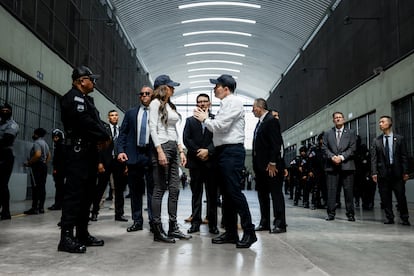
The immigration machinery set in motion by Trump since he took office for the second time has shown in just two months that his cruelty is not shy. Quite the contrary. The policy of performative terror unleashes in millions of people in the United States the fear of being caught in the clutches of the Republican government and released into a maximum security prison that, in a dialectical coincidence worthy of analysis, boasts of being the guardian of terrorism.
No information comes out of its walls. There is no word on how the deported men are doing, or whether they know of the anguish of their families. Outside, the world talks about them now and then, while the global order is shaken by the same man who sent them there and suddenly made 238 independent lives have only one future.
Credits:
Design and layout: Mónica Juárez y Ángel Herdora.
Additional reporting: Florantonia Singer (Venezuela), Diego Stacey (Colombia) and Carla Gloria Colomé (United States).

